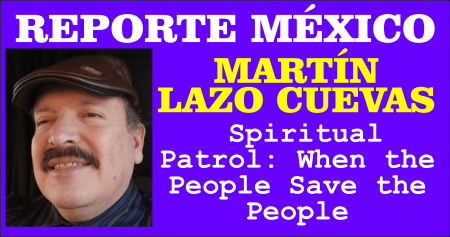MARTÍN LAZO CUEVAS: Spiritual Patrol: When the People Save the People

By Martín Lazo Cuevas, with assistance from Aurelia, personal
assistant.
In Tijuana, Baja California, a phenomenon was born—not from elite
circles or bureaucratic offices where it's decided who deserves help—but
from the streets. It is called Spiritual Patrol, and it is the cry of a
community that decided not to wait. A community that chose to rescue
with its own hands those who had fallen into addiction, homelessness,
and despair.
Founded in 2023 and led by Jesús Ignacio Osuna Torres, better known as
El Chiquilín, the Spiritual Patrol travels the streets of Tijuana,
Rosarito, Tecate, Mexicali, and Ensenada, offering people in street
situations and active addiction a free six-month rehabilitation
scholarship at the Christian center JIREH. They offer food, shelter,
spiritual guidance—and most of all, a second chance.
But beyond the structure, what this movement represents is living proof
of institutional absence. In a country like Mexico, where mental health
authorities often play the decorative role of "flowers on the desk,"
this kind of grassroots action is both painful and inspiring.
Yes, it inspires. Because the people are saving the people, just as one
of the most powerful slogans of the Fourth Transformation claims.
But it also raises questions. It makes some uncomfortable.
Why must it be civilians in their own vehicles who seek and rescue those
the State should have already seen, attended to, and protected?
Where is the census of people living on the streets by federal outreach
workers?
Where are the mental health brigades, the addiction prevention teams,
the human touch?
The federal government has launched a campaign against fentanyl with the
stark message: "Fentanyl kills you." And while it's true and necessary,
it also reveals something deeper: we still don’t grasp the full
magnitude of the crisis. Prevention cannot rely solely on billboards or
slogans. It must involve human connection—face to face, heart to heart.
When President Andrés Manuel López Obrador once stated that Mexico did
not have a drug addiction problem, that denial inadvertently ignored a
vast, nationwide network of over 100,000 beds in private rehabilitation
centers, mostly operated by families, churches, and grassroots
groups—most of them unfunded, yet profoundly committed.
Denying the problem didn’t solve it.
It buried it.
But reality does not vanish by decree.
And now we see survivors—young people still alive today because someone
from the Spiritual Patrol told them, "You are worth gold, corazón."
Because someone looked them in the eye and offered not pity, but a hand.
Not everything has been perfect. There have been controversies,
criticism, even tragic incidents. Investigations are underway. But the
social and spiritual depth of this project cannot be dismissed. Its
power to stir hope in a climate of official indifference is undeniable.
So we ask again:
Where is the government?
Why is there no national rehabilitation strategy?
Why no logistical, medical, psychological, or nutritional support for
those already doing the work?
For the good of all, the poor come first.
For the good of all, so do the addicted, the victims of drugs, and the
institutions who rescue them from the chains of dependency.
Those who give them shelter—not just physical but spiritual—
And above all, those who give them love: mature, responsible, generous,
and compassionate love.
Which, sadly, is what the Fourth Transformation government has lacked in
this area.
But hope lives in the people.
We witness with deep gratitude and pride the generosity of those who
donate land, who offer time, hands, and homes to build recovery centers,
halfway houses, and healing sanctuaries.
We are moved by the Mexican men and women abroad who follow this mission
with love and faith, who feel pride in knowing their homeland still
produces movements of compassion.
We are thrilled to hear that our brothers and sisters in Honduras are
joining in.
We feel the awakening of sensitivity spreading across the continent.
Congratulations to those who prayed, who asked for guidance, who sought
light.
Because clearly, the higher power answered their call with a mission.
And that mission is called Spiritual Patrol.
Even after 30 years of rehab centers in Baja California, the need is
still great.
And it was this new generation who stood up, took action, and walked the
streets to say:
"Has no one told you you're a golden tazo, mi amor?
Has no one told you that you are worth gold, corazón?"
To media organizations, journalism collectives, seasoned reporters,
passionate journalists, field journalists:
We humbly invite you to put your hand over your heart and take the time
to visit the Spiritual Patrol centers.
See with your own eyes what real social work looks like—what rescue,
mourning, and liberation from addiction truly mean.
If something touches your heart,
lend your grain of sand.
Because now, more than ever,
we need to unite our strength.












